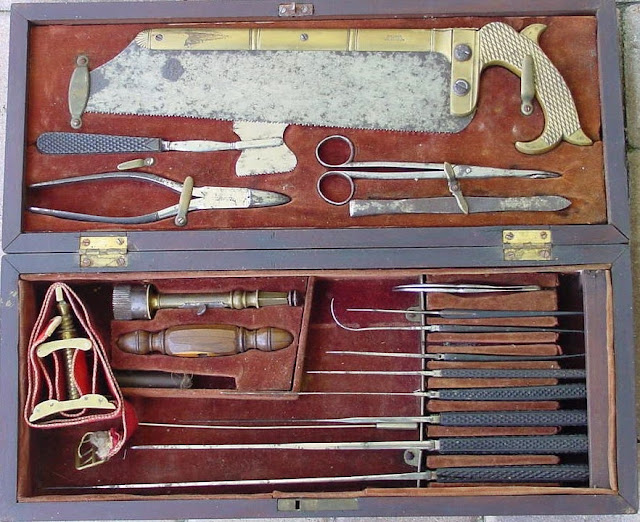Songs of Eretz Poetry Review is pleased to present “The Bone Cutter’s Lament” by James
Frederick William Rowe. Mr. Rowe
is an author and poet out of Brooklyn, New York, with works appearing in Heroic
Fantasy Quarterly, Big Pulp, Tales of the Talisman, Bete
Noire, and Andromeda Spaceways Inflight Magazine in addition to frequent appearances in the Songs
of Eretz venues. He is pursuing a Ph.D. in philosophy, is
an adjunct professor in the CUNY system, and works in a variety of
freelance positions. Contact him at http://jamesfwrowe.wordpress.com.
The
Bone Cutter’s Lament
James
Frederick William Rowe
I know that I
Must discard
More than God has taken
That they might walk
My saw shall cut
Inches higher than the wound
That muscle and flesh
(This too must I waste)
(And regret the loss of healthy flesh I do)
Might unnaturally join
Over cruelly shortened limbs
And form a stump
A useless end that has yet a use
To stabilize a peg
The war has taken many lives
But far more limbs are daily cut
And of these limbs
I know for each
How much excess bone is lost
Inches of bone
Bone which men beg me not to touch
And for which they cry when I remove
(Their agony I sympathize)
(But cut I must for their own good)
As they thrash and screech
And implore divine intervention
But God has already given unto me
Dispensation for this waste
This waste of precious bone
Allow me now to muse
Upon a subject most macabre
How many men have I wasted
In the bone I have removed?
I mean to say their skeleton
What weight in bone have I attained?
Is it enough to fill a man?
I dare say that it is more
(Far more indeed I reckon)
(Oh what misery it is to know!)
My surgeon stink I offer as proof
It follows me far beyond the table
And shall not be washed away
No, not so easily discarded
So unlike the bone
I am the bone cutter
And such is my lament
Poet’s Notes: About a
year before I wrote the poem, I found myself curious one night as to why it was
that amputations were historically performed with a bone saw, a horrible
implement of human suffering, compared to what I thought a far more humane
employment of an axe, sword, or any other sharp tool that may have severed the
limb quickly and with far less pain. After only a little bit of research, I
came upon a 19th century American doctor's writings on the subject of
amputation, who revealed the rationale for the use of the saw had a sound,
medical reason, in the formation of a post-operative stump. Without the use of
a bone saw, the bone would not be cut smoothly, and if the cut were not made
several inches higher than the damage, which entailed sacrificing much healthy
bone, the excess skin and muscle could not be folded over the leg in order to
provide a stump. Far from being a mere exercise in medical cruelty, the bone
saw provided the only hope a man would have to be able to use the limb for any
purpose afterwards.
It was the detail of wasting bone, through the cutting
much higher than the damage that stuck with me the most. Though I'm not a
doctor, I could only imagine that any man who has dedicated his life to healing
others must have felt so aggrieved by the fact that he had to harm his patients
even more in order to help them—that he "must discard more than God has
taken." When the subject came back to me rather randomly one day, it was
the return to this line of thought that proved to be the spark of inspiration
needed for a poem that came easily to me—I wrote the whole thing in less than a
day—and which served as the foundation for its theme of regret over this sad
necessity of his surgical amputations.
The overall form of the poem came naturally to me as the
words formed in my mind. The only aspects that required significant work were
the parenthetical asides that are featured once in every stanza. I had used
this style once before in another poem, and I thought their introduction to
this poem would add something to the aesthetics of the piece by changing the
rhythm up and splitting the stanzas.
Editor’s Note:
As a medical doctor, I can personally attest that Mr.
Rowe has captured the conflicting feelings that accompany the agonizing
decision to “waste” healthy tissue in order to achieve a better overall
surgical outcome. "The Bone Cutter's Lament" first appeared in the November 2013 issue of Songs of Eretz Poetry E-zine.

No comments:
Post a Comment
Note: Only a member of this blog may post a comment.